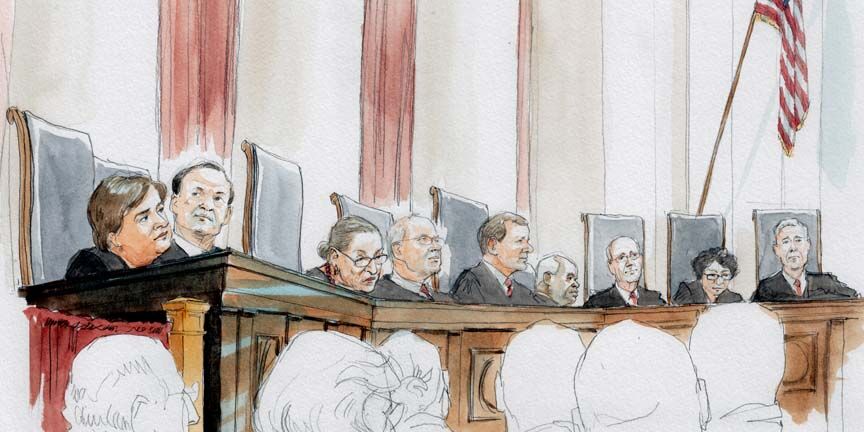Status Quo Watch

on Nov 15, 2017 at 3:18 pm

John Elwood reviews Monday’s relists.
Monday’s order list was a fitting one as the nation approaches the Thanksgiving holiday: It began with a flurry of excitement, followed by torpor.
The excitement came, of course, from the fact that the court granted review in three relisted cases, all of them raising interesting First Amendment questions: four-time relist National Institute of Family and Life Advocates v. Becerra, 16-1140 (presenting a challenge to a California law requiring crisis-pregnancy centers to provide visitors with certain notices); four-time relist Minnesota Voters Alliance v. Mansky, 16-1435 (involving a challenge to a Minnesota law banning political apparel at polling places); and one-time relist Lozman v. City of Riviera Beach, Florida, 17-21 (concerning whether the existence of probable cause defeats a First Amendment retaliatory-arrest claim as a matter of law). There was excitement of a different kind in three-time relist Reeves v. Alabama, 16-9282, as Justice Sonia Sotomayor (joined by Justices Ruth Bader Ginsburg and Elena Kagan) dissented from denial of cert in a case involving whether a prisoner can make an ineffective assistance of counsel claim when trial counsel does not testify about his or her strategic decisions. With two cases related to National Institute of Family and Life Advocates now being held (A Woman’s Friend Pregnancy Resource Clinic v. Becerra, 16-1146, and Livingwell Medical Clinic, Inc. v. Becerra, 16-1153), the relist rolls have been trimmed by six cases.
But now things are slowing down. We’ve hand–checked the entire docket and there are no new relists going in to Thanksgiving week. So good news, everybody – we can use this coming week to do just what we ought to be doing this time of year: come together with our families and face the soul-crushing emptiness of our lives.
But seriously: Happy Thanksgiving to (both of) our readers! Safe travels!
I am thankful for the help of Kevin Brooks and Kent Piacenti in compiling the cases in this post.
========================================================
New Relists
What – you didn’t read the post? There are no new relists.
Returning Relists
Sykes v. United States, 16-9604
Issue: Whether Missouri’s second-degree burglary statute is divisible into two offenses with separate elements for the purpose of analyzing whether a conviction under that statute qualifies as a conviction for a “violent felony” as defined in the Armed Career Criminal Act of 1984, 18 U.S.C. § 924(e)(2)(B)(ii).
(relisted after the October 6, October 13, October 27, November 3 and November 9 conferences)
Issues: (1) Whether reasonable jurists could disagree with the district court’s rejection of the petitioner’s Rule 60(b) motion, and, accordingly, whether the U.S. Court of Appeals for the 11th Circuit erred in denying a certificate of appealability; (2) whether, given the petitioner’s credible evidence that a juror voted for the death penalty because the petitioner is a “nigger,” the lower court erred in ruling that he failed to make “a substantial showing of the of the denial of a constitutional right” under 28 U.S.C. § 2253(c)(2); and (3) whether Pena-Rodriguez v. Colorado created a new constitutional claim, and, if not, whether the lower courts erred in denying the petitioner’s motion for relief from judgment under Rule 60(b)(6).
(relisted after the October 6, October 13, October 27, November 3 and November 9 conferences)
Issue: Whether, when the Alabama Supreme Court failed to apply the reasoning and analysis mandated by the Supreme Court’s decision in Foster v. Chatman, the U.S. Supreme Court should intervene to enforce its precedents following Batson v. Kentucky, which prohibit discrimination in jury selection on the basis of race or gender.
(relisted after the October 27, November 3 and November 9 conferences)
Upstate Citizens for Equality v. United States, 16-1320
Issues: (1) Whether Congress in the exercise of its Article I powers can infringe, reduce or diminish the territorial integrity of a state without its prior consent; (2) whether Congress possesses plenary power over Indian affairs and if so whether the Indian commerce clause authorizes the displacement of state rights to territorial integrity; (3) whether the land acquisition in this case via the mechanism of 25 U.S.C. § 465 (now 25 U.S.C. § 5108) represents a violation of the limits inherently expressed in the Indian commerce clause that limits Congress’ power to “regulate” “commerce”; and (4) whether the 300,000-acre ancient Oneida Indian reservation in New York still exists.
(relisted after the November 3 and November 9 conferences)
Town of Vernon, New York v. United States, 17-8
Issues: (1) Whether a tribe that opted out of the Indian Reorganization Act can have its status under the Act revived under the Indian Land Consolidation Act, 25 U.S.C. § 2202, even though the United States did not hold land in trust for that tribe at the time the tribe sought a land-in-trust acquisition; (2) whether the land-in-trust provision of the Indian Reorganization Act, 25 U.S.C. § 5108, exceeds Congress’ authority under the Indian commerce clause, Art. I, § 8, cl. 3; (3) whether § 5108’s standardless delegation of authority to acquire land “for Indians” is an unconstitutional delegation of legislative power; and (4) whether the federal government’s control over state land must be categorically exclusive for the enclave clause, Art. I, § 8, cl. 17, to prohibit the removal of that land from state jurisdiction.
(relisted after the November 3 and November 9 conferences)


